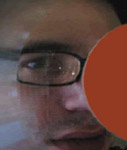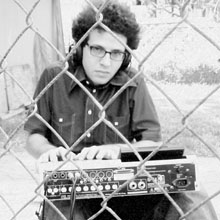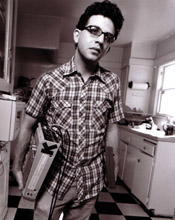

Books on Tape is Todd Drootin. Todd Drootin is Books on Tape. Behind his stage-presence frenzy of curly hair and clenched fist pedal pounding lies, surprisingly, exactly what you would expect to find: a So-Cal electronic genius with a penchant for alcohol and mild case of ADHD. With his most recent release, Books on Tape Sings the Blues, doing extremely well and a string of shows recruiting new fans from beyond our American borders, these two characteristics seem to only help the man at this point. In our interview with the man/music (and really, even the slash is a generous separation between the two) Todd fills us in on his take on electronic music in general, the wide appeal of his particularly spastic blend of arty electronica and the never-ending joys of kicking ass at Canadian Scrabble. This guy never stops!
JT: You played a show this weekend? Where was it?
TD: I played in Oakland at an event organized by Restiform Bodies, who are one of my top three favorite live acts in the country. They played, as did my friend Alan Astor from New York, Blevin Blectum and Lesser from the Tigerbeat6 crew (together, as Sagan) and myself. Restiform and I are doing a 3-day tour at the end of this month which I am super-psyched about.
JT: What are your other top two live acts?
TD: Parts And Labor and Mixel Pixel, both from NYC.
JT: Have you been playing around a lot?
TD: Yeah, I just did a 10-day tour from Halifax, Nova Scotia to Queens, NY.
JT: You were telling me before about how you and Canada are like "this" [representing a gesture of crossed fingers].
TD: Yeah, even more so now. I want to get nominated for citizenship.
JT: You have to be nominated? Like an awards show?
TD: I think it is even more of a process. And the taxes are "wicked", as the wonderful people of Halifax were so fond of saying. But I do love it up there. Actually, that's wicked in the wrong context. I'm so West coast.
JT: Yeah, get with it man. But is there a pretty big electronic scene up in Canada?
TD: Well, my success, I find more and more, has little, or, more accurately, nothing to do with an electronic scene. I certainly play parties and shows with other electronic acts, but I seem to do just as well in front of rock audiences, indie kids, just anyone with an open mind. So I can go into somewhere - like Halifax, which has never seen anything electronic before, let alone the ever-rollicking Books on Tape Stage Show, and be wildly appreciated.
JT: Why would you say that is?
TD: Because I think my appeal is that I connect with an audience like a rock band does. Through my energy, my attention to the audience - both verbally and musically - I feel like people are excited to see a kind of music being done in a manner that they may not quite understand but get to visualize firsthand.
JT: Are you even paying attention to the audience? To me it always seems like you are lost in your fun world of beats and pedals. Do you make an effort to feed off the audience?
TD: I always have a sense of the audience. You're dead on - I couldn't pick out my sister in an audience, I'm so wrapped up - but I do have a sense of what a particular room wants. A good example is my experience in Halifax. The first show was at a bar with a rock band. It was nuts. People were chanting "Books! On! Tape!" and dancing like crazy. I had all my energy and delivered the full-on energetic set. Beers were brought up, some were drank, others went flying in my frenzy...
JT: Oh no! Don't lose the beer!
TD: The next day, I played a daytime show at a kind of granola, co-op place. I didn't want to do the typical Todd/Books on Tape self-deprecation, political humor, audience participation/observation and up-tempo energy madness thing. So I asked the audience if it was okay if I did something different. And they were happy enough that an act paid attention to their town that they were receptive. So I did a sit-down set. I played slower songs that I never or almost never do in my shows. It was a lot of fun, but most circumstances wouldn't call for that at all, so it may never happen again. The point being, the audience plays a HUGE role in my live shows.
JT: That's great that you can do different things and still get a good response, because sometimes I think that electronic music either has to be ambient or dancey for people to understand it. Do you find that people traditionally expect electronic music to be dance music?
TD: Yeah. Definitely. Always, the first thing I say: "Well electronic music - but not like dance music." But then I always end up going, "Well, some people dance to it." So everyone is just as confused as me.
JT: Yeah, that¹s not to say that your music isn't often dancey. Shit, I can't keep my feet from a-tappin'. And neither can you, it seems like.

TD: No, my stuff definitely can get a room going. And the flailing I do is getting me quite a reputation, deservedly as a spazz. But I'll tell you this: someone caught on, during my Canada to New York tour, I forget who and I forget where because all I did was drink.
JT: Rightfully so...
TD: But someone noticed: "Your flailing keeps you on beat." And that's exactly right. I didn't even realize that.
JT: That's really interesting that you say that. I grew up playing in the classical band at school, and they always teach you to tap your foot to the beat, because your body has an amazing sense of rhythm, and it keeps you on time. And makes you look super cool at the same time.
TD: Yeah, tapping my feet would be one thing. Last Friday I had to tiptoe around Lesser and Blevin's super-nice gear - a bit dicey. No laptops were harmed.
JT: I was just thinking that maybe you don't have as much gear to tote around as a regular band, but really, that's probably not true, huh?
TD: I have just less than too much gear for one person to cart around. Solo touring is rugged. One thing that I wanted to mention is that electronic music is going through a big change. Almost everyone is acknowledging it. That's one of the really great things about Mixel Pixel - they could be your typical indie-rock band, but they add beats and Nintendo noises and flirt with electronics, which is starting to become very commonplace with bands like Radiohead and The Flaming Lips. I mean, even Steve Malkmus is using a Groovebox.
JT: Do you think the lines are being blurred?
TD: Yeah. That's why I can go out and open for Cursive, play the electronic parties, and play with hip-hop acts and get similar responses. Because all of that music flirts with electronica. I mean, Tim [Kasher] and Ted [Stevens, both of Cursive] both had electronic gear when I went out with them last year.
JT: Is there a certain common aesthetic or maybe essence that your form of electronic music shares with more traditional indie/punk stuff?
TD: There definitely is something personal about it. A lot of electronic music has no place being played for kids who like Bright Eyes. There's some very impersonal electronica. But there's completely irrelevant singer/songwriters too.
JT: What makes your music so personal?
TD: I take it really seriously. Which makes it hard for me. I used to be able to compartmentalize everything, like a Todd shelf and a Books on Tape shelf. Now that's impossible. I think my energy is pretty much the binding thread of the various ways I've heard my reputation precede me.
JT: You have a lot of energy aside from your music anyway.
TD: Well, I'm a typical ADHD Leo if you believe any of that...I'm not sure I do, but I fit both profiles.
JT: But as far as the electronic shift goes, what is it exactly that's happening? And is it a good thing?
TD: I think early electronica - trance, jungle, all the stuff that is so easy to generalize; '90s techno in general - gave electronics a real black eye. I was a drummer until the late '90s. A lot of people I played with thought electronics were the death of rock and all that. I never liked that music, I still really don't follow the electronic music scene, but I've always thought that different approaches could be taken to electronics. The gear is limited, but really versatile at the same time, if you spend the time, energy and creativity to play around with it enough.
JT: I always wanted to know how much of your music is the result of "playing" and how much is deliberate...
TD: I improvise, sometimes more than others, but always enough to make every time I play a song significantly different. But the structures I keep pretty much the same, and I also have a pretty good idea what any given twist or slam of my hand is going to do, although I will admit that even still, I do surprise myself sometimes and find a new trick or a new sound trick in the middle of a show.
JT: That has got to help your live show, when the element of spontaneity is still there. The sense comes across that you really use the art of randomness to its fullest. Would you say that's apt?
TD: Exactly. Thankfully, most of the surprises are pleasant, and when they aren't, I usually find a way to use them to my advantage, which is an old jazz trick. Repeating mistakes.
JT: That's a major part of what makes your music so much of what it is, your obvious use of those other genres. Just how the indie stuff is using electronics, your indie roots really show up too.
TD: I like to impose my personality on my music, because I feel who I am and what I listen to and love is a really important part of understanding what I do and how I sound. Electronic music usually has no face.
JT: Yeah, the impersonal, mechanical nature of electronics is a big part of that '90s tarnish that is left over. It's like our fear of robots (which we all have, you know), we're worried to allow electronics to have too much human components.
TD: I fear my robots! But yeah, I don't know if this is an old joke around non-electronic musicians, but a bunch of my friends laugh that they could check their email on stage and people wouldn't know the difference.
JT: See! They're gonna get you one day. And I knew those guys just check email! I'm convinced they just press "play" on their screen and then let it run while they write letters or play Doom.
TD: And I'm not sure it is that much different, what they are doing. People always tell me a laptop is smaller, less limited and more efficient. And I say "Exactly." I don't want an instrument that can play itself. People have seen laptops. I guarantee that, unless they have seen me before, they've never seen the same set up. And the approach is completely antitheoretical to what has become the standard for electronic music. Or is that antithetical? What do I mean?
JT: Eh? I'm going to go with the latter.

TD: I think so. I'm usually quite good with the vocab. I won bilingual scrabble in Montréal even though I was the only one who spoke no French. Well, I will admit, I got a 50-point, seven-letter bonus and that nabbed it
JT: And I must ask you about the next step? Recording, more touring, shows? Where can your many stalkers find you?
TD: One thing that I am really excited about but not ready to spill the beans on yet is a 3-way project with two Brooklyn bands where I remix an original by each of them. I hope that comes together. Some touring, getting married in May so a bit of time off, remixing almost everyone that asks (I love the remix), more US touring and getting the 3rd Books on Tape full-length done. I'd say a little less than half the songs are ready. I'm actually excited for a recording lag, because I didn't identify with my debut album, so I was frantic to get out an album that I felt represented me. So I'm happy to let Books on Tape Sings The Blues stand for a while...
[And so are we...]
For more info on Books on Tape, click here.